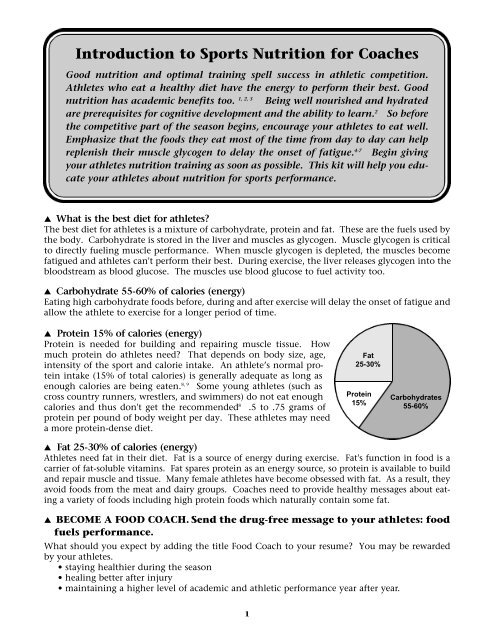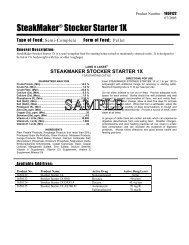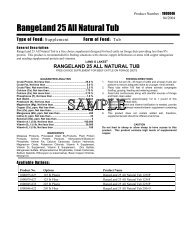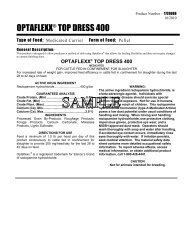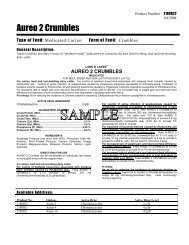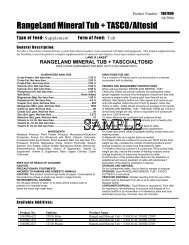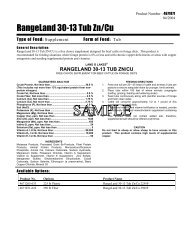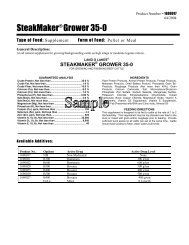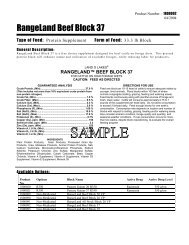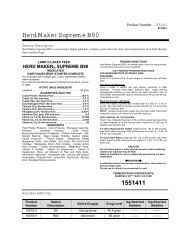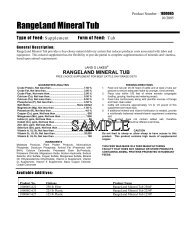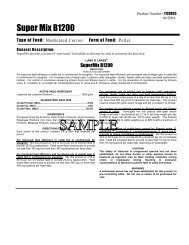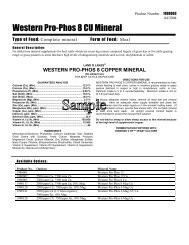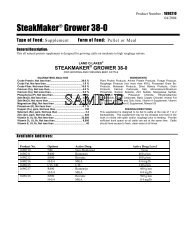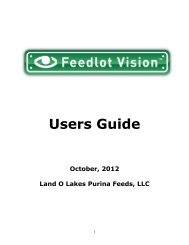Sports Nutrition - Beeflinks
Sports Nutrition - Beeflinks
Sports Nutrition - Beeflinks
Create successful ePaper yourself
Turn your PDF publications into a flip-book with our unique Google optimized e-Paper software.
Introduction to <strong>Sports</strong> <strong>Nutrition</strong> for Coaches<br />
Good nutrition and optimal training spell success in athletic competition.<br />
Athletes who eat a healthy diet have the energy to perform their best. Good<br />
1, 2, 3<br />
nutrition has academic benefits too. Being well nourished and hydrated<br />
are prerequisites for cognitive development and the ability to learn. 2 So before<br />
the competitive part of the season begins, encourage your athletes to eat well.<br />
Emphasize that the foods they eat most of the time from day to day can help<br />
replenish their muscle glycogen to delay the onset of fatigue. 4-7 Begin giving<br />
your athletes nutrition training as soon as possible. This kit will help you educate<br />
your athletes about nutrition for sports performance.<br />
▲ What is the best diet for athletes?<br />
The best diet for athletes is a mixture of carbohydrate, protein and fat. These are the fuels used by<br />
the body. Carbohydrate is stored in the liver and muscles as glycogen. Muscle glycogen is critical<br />
to directly fueling muscle performance. When muscle glycogen is depleted, the muscles become<br />
fatigued and athletes can't perform their best. During exercise, the liver releases glycogen into the<br />
bloodstream as blood glucose. The muscles use blood glucose to fuel activity too.<br />
▲ Carbohydrate 55-60% of calories (energy)<br />
Eating high carbohydrate foods before, during and after exercise will delay the onset of fatigue and<br />
allow the athlete to exercise for a longer period of time.<br />
▲ Protein 15% of calories (energy)<br />
Protein is needed for building and repairing muscle tissue. How<br />
much protein do athletes need? That depends on body size, age,<br />
intensity of the sport and calorie intake. An athlete’s normal protein<br />
intake (15% of total calories) is generally adequate as long as<br />
enough calories are being eaten. 8, 9 Some young athletes (such as<br />
cross country runners, wrestlers, and swimmers) do not eat enough<br />
calories and thus don't get the recommended 8 .5 to .75 grams of<br />
protein per pound of body weight per day. These athletes may need<br />
a more protein-dense diet.<br />
Fat<br />
25-30%<br />
Protein<br />
15%<br />
Carbohydrates<br />
55-60%<br />
▲ Fat 25-30% of calories (energy)<br />
Athletes need fat in their diet. Fat is a source of energy during exercise. Fat's function in food is a<br />
carrier of fat-soluble vitamins. Fat spares protein as an energy source, so protein is available to build<br />
and repair muscle and tissue. Many female athletes have become obsessed with fat. As a result, they<br />
avoid foods from the meat and dairy groups. Coaches need to provide healthy messages about eating<br />
a variety of foods including high protein foods which naturally contain some fat.<br />
▲ BECOME A FOOD COACH. Send the drug-free message to your athletes: food<br />
fuels performance.<br />
What should you expect by adding the title Food Coach to your resume? You may be rewarded<br />
by your athletes.<br />
• staying healthier during the season<br />
• healing better after injury<br />
• maintaining a higher level of academic and athletic performance year after year.<br />
1


